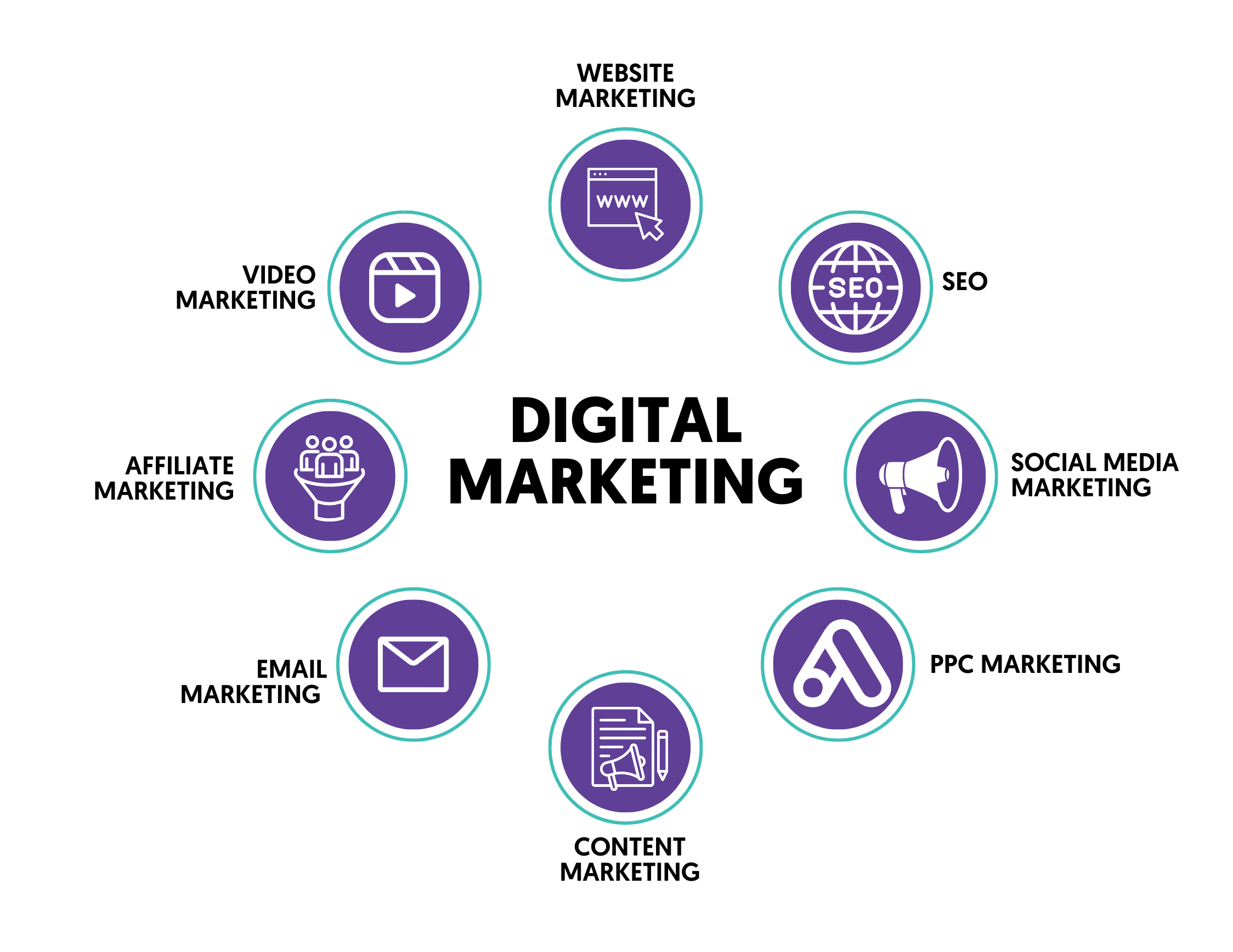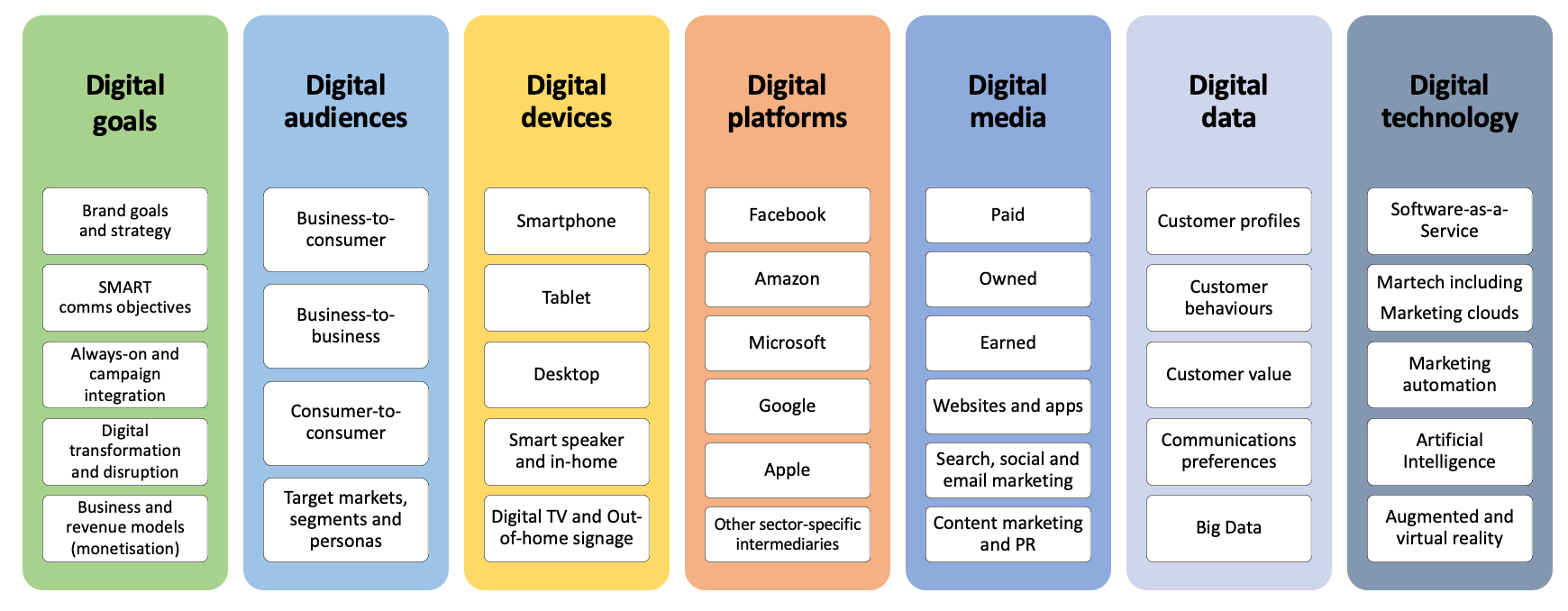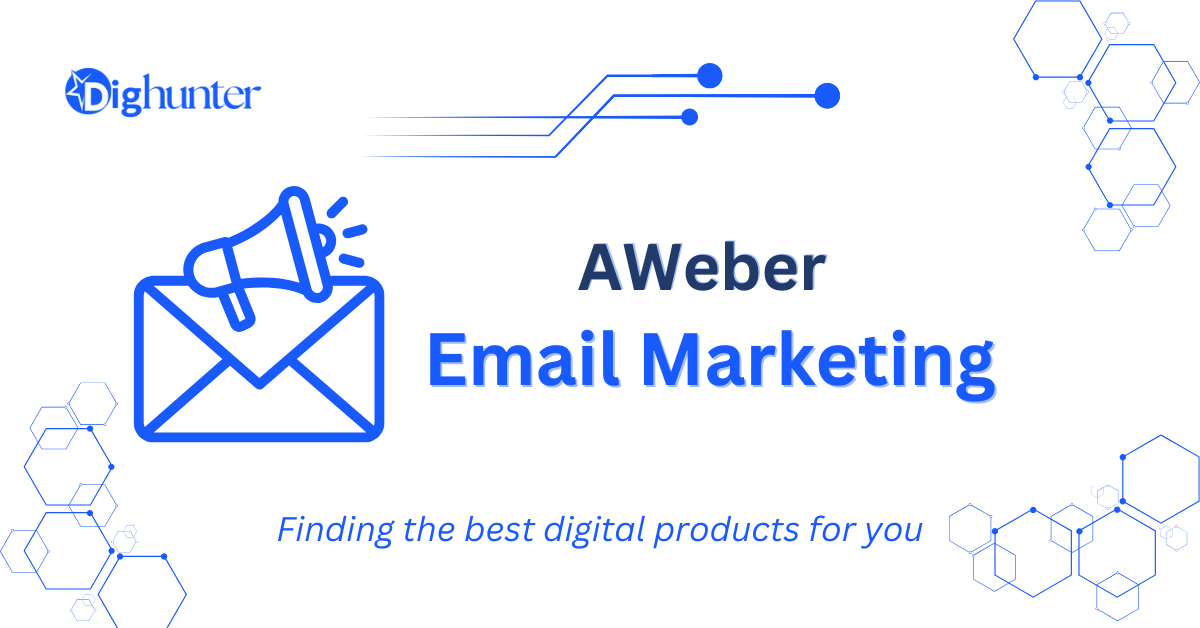Digital Marketing promotes products or services using digital channels. It includes strategies like SEO, content marketing, and social media.
Digital marketing leverages online platforms to connect with potential customers. It involves various tactics such as search engine optimization (SEO), pay-per-click (PPC) advertising, social media marketing, and content creation. Businesses use these strategies to increase brand awareness, drive traffic, and generate leads.
With the rise of the internet, digital marketing has become essential for businesses of all sizes. It offers a cost-effective way to reach a global audience. Understanding key metrics and analytics is crucial for optimizing campaigns. Effective digital marketing can significantly boost a company’s online presence and profitability. Anyway, do not forget to learn the history of digital marketing.

Credit: www.reliablesoft.net
➡️What is Digital Marketing?
Digital Marketing is a broad term that encompasses all marketing efforts using the internet or electronic devices. Businesses leverage digital channels such as search engines, social media, email, and websites to connect with current and prospective customers. But what exactly is Digital Marketing? Let’s dive into the details.
Key Components
Digital Marketing consists of several key components that work together to create a cohesive strategy:
- Search Engine Optimization (SEO): The process of optimizing your website to rank higher on search engine results pages (SERPs).
- Content Marketing: Creating and distributing valuable content to attract and engage your target audience.
- Social Media Marketing: Using social media platforms to promote your brand and connect with your audience.
- Email Marketing: Sending targeted emails to nurture leads and convert them into customers.
- Pay-Per-Click (PPC): Running paid ads on search engines and social media to drive traffic to your website.
- Affiliate Marketing: Partnering with other businesses or influencers to promote your products or services.
- Online PR: Managing your online reputation through digital publications, blogs, and other content-based websites.
Each of these components plays a crucial role in building a robust Digital Marketing strategy. Here’s a table summarizing the key components:
| Component | Description |
|---|---|
| SEO | Optimizing your website to rank higher on SERPs |
| Content Marketing | Creating and distributing valuable content |
| Social Media Marketing | Promoting your brand on social media platforms |
| Email Marketing | Sending targeted emails to leads |
| PPC | Running paid ads to drive traffic |
| Affiliate Marketing | Partnering with others to promote your products |
| Online PR | Managing your online reputation |
Importance in Today’s World
Digital Marketing is crucial in today’s world for several reasons:
Broad Reach: With billions of people online, Digital Marketing allows businesses to reach a vast audience. It’s easier to target specific demographics and interests.
Cost-Effectiveness: Compared to traditional marketing, Digital Marketing is more affordable. You can set your budget and adjust it based on performance.
Measurable Results: Digital Marketing tools offer real-time analytics. You can track your campaigns’ performance and make data-driven decisions.
Enhanced Engagement: Social media platforms provide direct interaction with customers. This fosters a sense of community and brand loyalty.
Flexibility: Digital Marketing strategies can be quickly adapted to changing market conditions. This ensures your business stays relevant.
Personalization: You can tailor your marketing messages to individual users. Personalized content increases the chances of conversion.
Here’s a quick list of why Digital Marketing matters:
- Global reach
- Cost-effective
- Measurable results
- Direct customer engagement
- Adaptable strategies
- Personalized marketing
In a nutshell, Digital Marketing is not just a trend; it’s a vital tool for modern businesses. Embracing it can lead to significant growth and success.

Credit: www.davechaffey.com
➡️Types of Digital Marketing
Digital marketing encompasses various strategies to reach and engage with potential customers online. Each type of digital marketing serves a unique purpose and utilizes different tactics to achieve business goals. Let’s explore the most common types of digital marketing to understand how they can help grow your business.
Search Engine Optimization
Search Engine Optimization (SEO) is the practice of optimizing a website to rank higher in search engine results pages. Higher rankings increase visibility and drive organic traffic to the website.
SEO involves several key components:
- Keyword Research: Identifying relevant keywords that potential customers use to search for products or services.
- On-Page SEO: Optimizing individual web pages, including title tags, meta descriptions, headers, and content.
- Off-Page SEO: Building backlinks from other reputable websites to increase domain authority.
- Technical SEO: Ensuring the website is technically sound, including site speed, mobile-friendliness, and secure connections (HTTPS).
Effective SEO can lead to sustained long-term growth and increased website traffic.
Content Marketing
Content Marketing involves creating and distributing valuable, relevant content to attract and engage a target audience. The goal is to provide useful information to potential customers, which can help build trust and establish authority.
Common types of content include:
- Blog Posts: Regularly updated articles that provide insights, tips, and information related to your industry.
- eBooks and Whitepapers: In-depth guides that offer extensive information on a specific topic.
- Infographics: Visual representations of data and information that are easy to understand and share.
- Case Studies: Detailed accounts of how your product or service helped a customer achieve their goals.
Quality content can drive traffic, generate leads, and nurture customer relationships.
Social Media Marketing
Social Media Marketing leverages social media platforms to promote products, services, and brand messages. It allows businesses to engage with their audience directly and build a community around their brand.
Key aspects of social media marketing include:
- Content Creation: Producing engaging posts, images, videos, and stories tailored to each platform.
- Advertising: Running paid campaigns to reach a broader audience and target specific demographics.
- Engagement: Interacting with followers through comments, messages, and live sessions.
- Analytics: Tracking performance metrics to understand what works and optimize future efforts.
Effective social media marketing can increase brand awareness, drive traffic, and boost sales.
Search Engine Marketing
Search Engine Marketing (SEM) involves using paid advertising to increase visibility on search engines. Unlike SEO, which focuses on organic rankings, SEM uses pay-per-click (PPC) ads to appear at the top of search results.
Key components of SEM include:
- Keyword Bidding: Bidding on keywords relevant to your business to display ads when users search for those terms.
- Ad Creation: Crafting compelling ad copy and visuals to attract clicks.
- Landing Pages: Designing optimized landing pages where users land after clicking on ads.
- Performance Tracking: Monitoring click-through rates (CTR), conversion rates, and return on investment (ROI).
SEM can deliver immediate results and drive targeted traffic to your website.
Email Marketing
Email Marketing involves sending targeted emails to a list of subscribers. It is a powerful way to nurture leads, build relationships, and drive sales. For this, you can use the best email marketing tools.
Effective email marketing includes:
- Segmentation: Dividing your email list into segments based on demographics, behavior, or preferences.
- Personalization: Tailoring email content to address the specific needs and interests of each segment.
- Automation: Using automated email sequences to send timely and relevant messages.
- Metrics: Tracking open rates, click rates, and conversions to measure success.
Well-executed email marketing can drive engagement, loyalty, and revenue.
Video Marketing
Video Marketing uses video content to promote products, services, or brand messages. A video content is highly engaging and can convey information effectively.
Common types of video content include:
- Product Demos: Showcasing product features and benefits.
- Tutorials: Providing step-by-step instructions on how to use a product or service.
- Testimonials: Sharing customer success stories and reviews.
- Brand Stories: Telling the story of your brand and its values.
Video marketing can increase engagement, build trust, and drive conversions. Anyway, you can boost your video marketing by using the top video marketing tools.
Affiliate Marketing
Affiliate Marketing involves partnering with affiliates who promote your products or services in exchange for a commission on sales. It is a performance-based marketing strategy.
Key elements of affiliate marketing include:
- Affiliate Network: Joining a network that connects businesses with potential affiliates.
- Affiliate Selection: Choosing affiliates who align with your brand and have a relevant audience.
- Tracking: Monitoring affiliate performance and tracking sales generated through their efforts.
- Commission Structure: Setting a commission rate that incentivizes affiliates while ensuring profitability.
Affiliate marketing can expand your reach, drive sales, and reduce marketing costs.
➡️Trends in Digital Marketing
Digital marketing is ever-evolving, with new trends shaping the way businesses connect with their audiences. Staying updated with the latest trends is crucial for success. Here, we explore some of the most significant trends in digital marketing.
AI and Automation
Artificial Intelligence (AI) and automation are transforming digital marketing. Businesses use AI to analyze data, predict customer behavior, and personalize user experiences. Automation helps in streamlining repetitive tasks, saving time, and increasing efficiency. Here are some key points:
- Chatbots: These AI-powered tools provide instant customer support and improve user engagement.
- Email Automation: Automatically send personalized emails based on user actions and preferences.
- Predictive Analytics: Analyze past data to forecast future trends and customer behaviors.
Consider the following table for AI and automation tools:
| Tool | Function |
|---|---|
| HubSpot | Email Automation |
| Drift | Chatbots |
| Google Analytics | Predictive Analytics |
Influencer Marketing
Influencer marketing leverages individuals with a large following to promote products. It has become a powerful tool due to its authenticity and reach. Key aspects include:
- Micro-influencers: They have smaller but highly engaged audiences.
- Authentic Content: Influencers create relatable and genuine content.
- Brand Partnerships: Long-term collaborations with influencers enhance brand loyalty.
Below is a list of popular platforms for influencer marketing:
- YouTube
- TikTok
Voice Search Optimization
Voice search is gaining popularity with the rise of smart speakers and virtual assistants like Alexa and Google Assistant. Optimizing for voice search involves:
- Long-Tail Keywords: Use natural language phrases that people speak.
- Featured Snippets: Aim to appear in position zero on Google for quick answers.
- Mobile-Friendly Websites: Ensure your site is easy to navigate on mobile devices.
Here is a table showing key elements for voice search optimization:
| Element | Description |
|---|---|
| Schema Markup | Enhances search engine understanding of your content |
| Page Speed | Faster load times improve voice search results |
| Local SEO | Optimizes for location-based searches |
➡️Creating A Digital Marketing Strategy
Digital marketing is a crucial part of any modern business. It helps companies reach their audience online. Creating a digital marketing strategy is essential for success. A well-crafted plan guides your efforts and maximizes results.
Setting Goals
Setting clear goals is the first step in creating a digital marketing strategy. Goals give you direction and help you measure success. Your goals should be SMART:
- Specific: Define what you want to achieve.
- Measurable: Ensure you can track progress.
- Achievable: Set realistic targets.
- Relevant: Align goals with your business objectives.
- Time-bound: Set a deadline for achieving goals.
Examples of SMART goals include:
| Goal | Example |
|---|---|
| Increase website traffic | Boost visits by 20% in 6 months |
| Improve social media engagement | Gain 500 new followers in 3 months |
| Generate leads | Get 100 new leads in 4 months |
Regularly review and adjust goals to stay on track. Use analytics tools to measure progress. Celebrate small wins and learn from failures.
Target Audience Analysis
Understanding your target audience is key to a successful digital marketing strategy. Know who they are, what they like, and where they spend time online. Start by creating buyer personas. These are fictional characters representing your ideal customers.
Include details such as:
- Demographics: Age, gender, income level
- Psychographics: Interests, values, lifestyle
- Online behavior: Websites they visit, social media platforms they use
Conduct surveys and use web analytics tools to gather data. Analyze competitors to see who their audience is and how they engage them. Use this information to tailor your content and messaging.
Engage with your audience on social media. Respond to comments, ask for feedback, and listen to their needs. This builds trust and loyalty.
Budgeting
Budgeting is crucial for an effective digital marketing strategy. Allocate funds wisely to get the best return on investment (ROI). Start by identifying all potential expenses:
- Advertising costs: PPC, social media ads
- Content creation: Blog posts, videos, infographics
- Tools and software: Analytics, SEO tools, email marketing platforms
- Personnel: Salaries for in-house team or fees for freelancers/agencies
Create a budget plan that outlines spending for each category. Monitor expenses regularly to stay within budget. Adjust your spending based on performance data. For example, if PPC ads are performing well, consider increasing that budget.
Use free or low-cost tools when possible. Many tools offer free trials or basic versions that can save money. Always measure ROI to ensure you’re getting value from your investments. Prioritize spending on activities that deliver the best results.
➡️Measuring Success
Digital Marketing is vital for any business. Measuring success helps you understand what works and what doesn’t. This way, you can adjust your strategies and achieve better results. Learn how to measure success through Key Performance Indicators and Analytics Tools.
Key Performance Indicators
Key Performance Indicators (KPIs) are essential for tracking your digital marketing efforts. They help you see if you’re reaching your goals. Here are some important KPIs:
- Website Traffic: Measures the number of visitors to your site. High traffic often means good reach.
- Bounce Rate: Shows the percentage of visitors who leave after viewing only one page. A high bounce rate might mean poor content or design.
- Conversion Rate: Indicates the percentage of visitors who take a desired action, like making a purchase or signing up for a newsletter. High conversion rates mean your campaigns are effective.
- Click-Through Rate (CTR): Measures how often people click on your ads or links. A high CTR indicates engaging content.
- Customer Lifetime Value (CLV): Shows the total revenue a business can expect from a single customer. Higher CLV means loyal customers.
Tracking these KPIs helps you understand your audience better. You can use this data to refine your strategies and achieve better results. Here’s a table summarizing these KPIs:
| KPI | Description |
|---|---|
| Website Traffic | Number of visitors to your site |
| Bounce Rate | Percentage of visitors who leave after one page |
| Conversion Rate | Percentage of visitors who take a desired action |
| Click-Through Rate (CTR) | Percentage of people who click on your ads or links |
| Customer Lifetime Value (CLV) | Total revenue expected from a single customer |
➡️Analytics Tools
Analytics tools help you track and measure your KPIs. They provide data that can guide your marketing decisions. Here are some popular analytics tools:
- Google Analytics: Offers detailed insights into website traffic, user behavior, and conversions. It’s free and widely used.
- SEMrush: Provides keyword research, site audits, and competitive analysis. Great for SEO and PPC campaigns.
- HubSpot: Combines analytics with CRM tools. Perfect for tracking leads and customer interactions.
- Hootsuite: Monitors social media engagement and performance. Useful for managing multiple social media accounts.
- Adobe Analytics: Offers advanced analytics and real-time data. Ideal for large enterprises with complex needs.
These tools help you gather important data. This data shows what’s working and what needs improvement. Here’s a table summarizing these tools:
| Tool | Description |
|---|---|
| Google Analytics | Insights into website traffic and user behavior |
| SEMrush | Keyword research and competitive analysis |
| HubSpot | Combines analytics with CRM tools |
| Hootsuite | Monitors social media engagement |
| Adobe Analytics | Advanced analytics and real-time data |
Using these tools helps you make data-driven decisions. This leads to more effective digital marketing strategies.

Credit: business.adobe.com
➡️Challenges in Digital Marketing
Digital marketing is a powerful tool for businesses to reach their audience. Yet, it comes with several challenges. These challenges require constant attention and adaptation. Understanding these obstacles can help businesses navigate the digital landscape more effectively.
Keeping Up With Changes
The digital marketing landscape changes rapidly. New platforms, algorithms, and tools emerge frequently. Staying updated is crucial for success. Marketers often face the challenge of adapting to these changes quickly.
Here are some key areas where changes occur:
- Social Media Algorithms: Platforms like Facebook and Instagram frequently update their algorithms. These changes can impact the reach and engagement of posts.
- SEO Practices: Search engines like Google update their ranking algorithms. This requires constant optimization of websites and content.
- Advertising Platforms: Ad platforms introduce new features and policies. Keeping up with these changes ensures effective ad campaigns.
To manage these changes, marketers can:
- Subscribe to industry blogs and newsletters.
- Attend webinars and workshops.
- Join professional communities and forums.
Employing these strategies helps marketers stay ahead of the curve. Adaptability becomes the key to thriving in a dynamic digital environment.
Data Privacy Concerns
Data privacy is a growing concern in digital marketing. With increased data breaches, consumers are wary of sharing their information. Marketers must prioritize data privacy to build trust with their audience.
Key concerns include:
- GDPR Compliance: The General Data Protection Regulation (GDPR) requires businesses to protect personal data. Non-compliance can lead to hefty fines.
- Consumer Trust: Consumers need assurance that their data is safe. Transparency about data usage builds trust.
- Data Security: Ensuring data security prevents breaches and unauthorized access. This involves using secure systems and protocols.
Steps to address data privacy concerns:
- Implement robust security measures.
- Provide clear privacy policies.
- Offer opt-in options for data collection.
By addressing these concerns, marketers can build a trustworthy relationship with their audience. Prioritizing data privacy is essential for long-term success in digital marketing.
➡️Future of Digital Marketing
Digital marketing is always changing. New tools and ideas come out every day. Businesses need to keep up to stay ahead. The future of digital marketing looks bright. It will be full of new chances and challenges. Here are some key trends to watch.
Emerging Technologies
Emerging technologies will shape the future of digital marketing. Artificial Intelligence (AI) is already making waves. It helps with tasks like data analysis and customer service. AI chatbots can answer customer questions 24/7. This improves user experience and saves time for businesses.
Augmented Reality (AR) and Virtual Reality (VR) offer new ways to engage customers. Imagine trying on clothes or seeing how furniture looks in your home without leaving your couch. These tools make shopping fun and easy.
Voice Search is another big trend. More people use smart speakers like Alexa and Google Home. Optimizing content for voice search will be crucial.
Here is a table showing key emerging technologies:
| Technology | Impact |
|---|---|
| Artificial Intelligence | Improves customer service and data analysis |
| Augmented Reality | Enhances online shopping experience |
| Voice Search | Changes how users find information |
| Blockchain | Increases security and transparency |
Consumer Behavior Shifts
Consumer behavior is changing fast. People are spending more time online. They use social media, watch videos, and shop on their phones. Knowing these habits is key for digital marketing.
Personalization is now a must. Consumers expect content that fits their needs. Businesses use data to tailor their messages. This makes customers feel valued and understood.
Sustainability is also important. More people care about the planet. They prefer brands that are eco-friendly. Highlighting green practices can attract these customers.
Social proof influences buying choices. Reviews, ratings, and testimonials matter. Positive feedback builds trust. Encourage happy customers to share their experiences.
Here are some key shifts in consumer behavior:
- Increased mobile usage
- Demand for personalized experiences
- Focus on sustainability
- Importance of social proof
Understanding these shifts helps businesses stay relevant. They can create better campaigns and connect with their audience.
➡️Case Studies
Case studies in digital marketing offer a deep dive into real-world campaigns. They show what works and what doesn’t. By examining these cases, marketers gain insights and improve their own strategies. This section highlights both successful campaigns and the lessons learned from them.
Successful Campaigns
Successful digital marketing campaigns can be a goldmine of information. They reveal the strategies and tactics that led to significant results. Let’s look at a few standout examples:
- Company A: This company used a mix of social media marketing and influencer partnerships. They achieved a 150% increase in brand awareness in just three months.
- Company B: They focused on email marketing and personalized content. Their efforts resulted in a 30% boost in customer retention.
- Company C: Utilizing SEO strategies and content marketing, they saw a 200% rise in organic traffic within six months.
To better understand these successes, let’s look at the key metrics involved:
| Company | Strategy | Outcome |
|---|---|---|
| Company A | Social Media, Influencers | 150% increase in brand awareness |
| Company B | Email Marketing, Personalized Content | 30% boost in customer retention |
| Company C | SEO, Content Marketing | 200% rise in organic traffic |
Lessons Learned
Each campaign offers valuable lessons. Here are some key takeaways from these successful digital marketing efforts:
- Know Your Audience: Companies that understand their audience see better results. Tailored content and targeted ads perform best.
- Leverage Multiple Channels: Combining social media, email, and SEO can amplify your reach and impact. Diversification is crucial.
- Consistency is Key: Regular updates and consistent messaging help maintain audience engagement and trust.
- Track and Analyze: Use analytics to measure success. Adjust strategies based on data insights for continuous improvement.
- Invest in Quality Content: High-quality content attracts and retains customers. It also boosts SEO rankings.
By learning from these case studies, marketers can refine their strategies. They can avoid common pitfalls and adopt best practices. This leads to more effective and successful digital marketing campaigns.
➡️Frequently Asked Questions
- What Is Digital Marketing?
Digital marketing is the promotion of products or services using digital technologies. It includes channels like social media, email, and search engines. This strategy helps businesses reach a broader audience online.
- Why Is Digital Marketing Important?
Digital marketing is essential because it reaches a global audience. It provides cost-effective ways to promote products. It also allows for targeted advertising and measurable results.
- How Does Seo Fit Into Digital Marketing?
SEO, or Search Engine Optimization, improves a website’s visibility on search engines. It is a crucial part of digital marketing. Good SEO practices help attract organic traffic, which leads to higher conversions.
- What Are Common Digital Marketing Strategies?
Common strategies include social media marketing, email campaigns, and content marketing. Pay-per-click advertising and influencer partnerships are also popular. Each strategy aims to engage users and promote brand awareness.
➡️Final Thought
Digital marketing is essential for modern business success. Embrace its strategies to stay ahead of the competition. Implementing effective techniques will drive growth and engagement. Stay updated with trends to maximize your efforts. By leveraging digital marketing, your business can reach new heights and achieve long-term goals.
Start your digital journey today.




